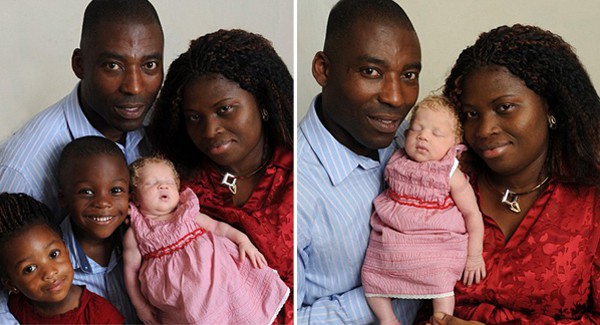British Nmachi Ihegboro has amazed genetics experts who say the little girl is NOT an albino. Dad Ben, 44, a customer services adviser, admitted: “We both just sat there after the birth staring at her.” Mum Angela, 35, of Woolwich, South London, beamed as she said: “She’s beautiful – a miracle baby.” The couple named the baby girl Nmachi, whose name means “Beauty of God” in the couple’s Nigerian homeland and they think it suits her so well.

He added: “Actually, the first thing I did was look at her and say, ‘What the flip?’” But as the baby’s older brother and sister – both black – crowded round the “little miracle” at their home in South London, Ben declared: “Of course she’s mine.”
It was the hair that initially confused him. “Obviously, she looked very light, but black babies are often much lighter-skinned at birth. it’s only over weeks and months that they get darker. But the hair was a shock from the off. Then the eyes. I have never seen such blue.”
Pale genes that disappear for generations before reappearing might explain the baby’s look. “My wife is loyal to me,” Ben added. Even if she hadn’t been, the baby wouldn’t have turned out that way. Although Angela was also taken aback, she found the most unexpected element to be other people’s reactions to her daughter’s skin hue.

Doctors are certain that the baby girl is not an albino. Professor Bryan Sykes, head of Human Genetics at Oxford University, says her birth is extraordinary on a genetic level. With no white ancestry to cause the occurrence, chances are that an unknown genetic mutation took place.
“In mixed race humans, the lighter variant of skin tone may come out in a child – and this can sometimes be startlingly different to the skin of the parents.
‘This might be the case where there is a lot of genetic mixing, as in Afro-Caribbean populations. But in Nigeria there is little mixing.”

Ben, who came to Britain with his wife five years ago and works for South Eastern Trains, said: “She doesn’t look like an albino child anyway – not like the ones I’ve seen back in Nigeria or in books. She just looks like a healthy white baby.” He went on: “My mum is a black Nigerian although she has a bit fairer skin than mine. “But we don’t know of any white ancestry. We wondered if it was a genetic twist. “But even then, what is with the long curly blonde hair?”
Nmachi’s churchgoing mum Angela admitted that she was “speechless” at first seeing her baby girl, who was delivered in a cesarean op. She said: “I thought, ‘What is this little doll?’ “She’s beautiful and I love her. Her color doesn’t matter. She’s a miracle baby.

“All that matters is that she’s healthy and that we love her. She’s a proud British Nigerian.” “In our culture, a baby is a blessing. It doesn’t matter whether it’s a boy or a girl, or whatever color her skin is,’ she points out.”
‘Yes, her coloring was a surprise. When they placed her in my arms, I looked at her and thought: “My goodness, I have never seen a baby of our race at this fair.” ‘And her hair! She looked like a doll. But the minute I held her, none of that mattered.
‘What has surprised me, though, is what other people have said. I’ve been asked: “Are you going to treat her any differently because she is lighter-skinned?” Of course not. Am I going to love her any less? Absolutely not. When she gets older and asks me why she is different, I will just say: “it was God’s will.”


